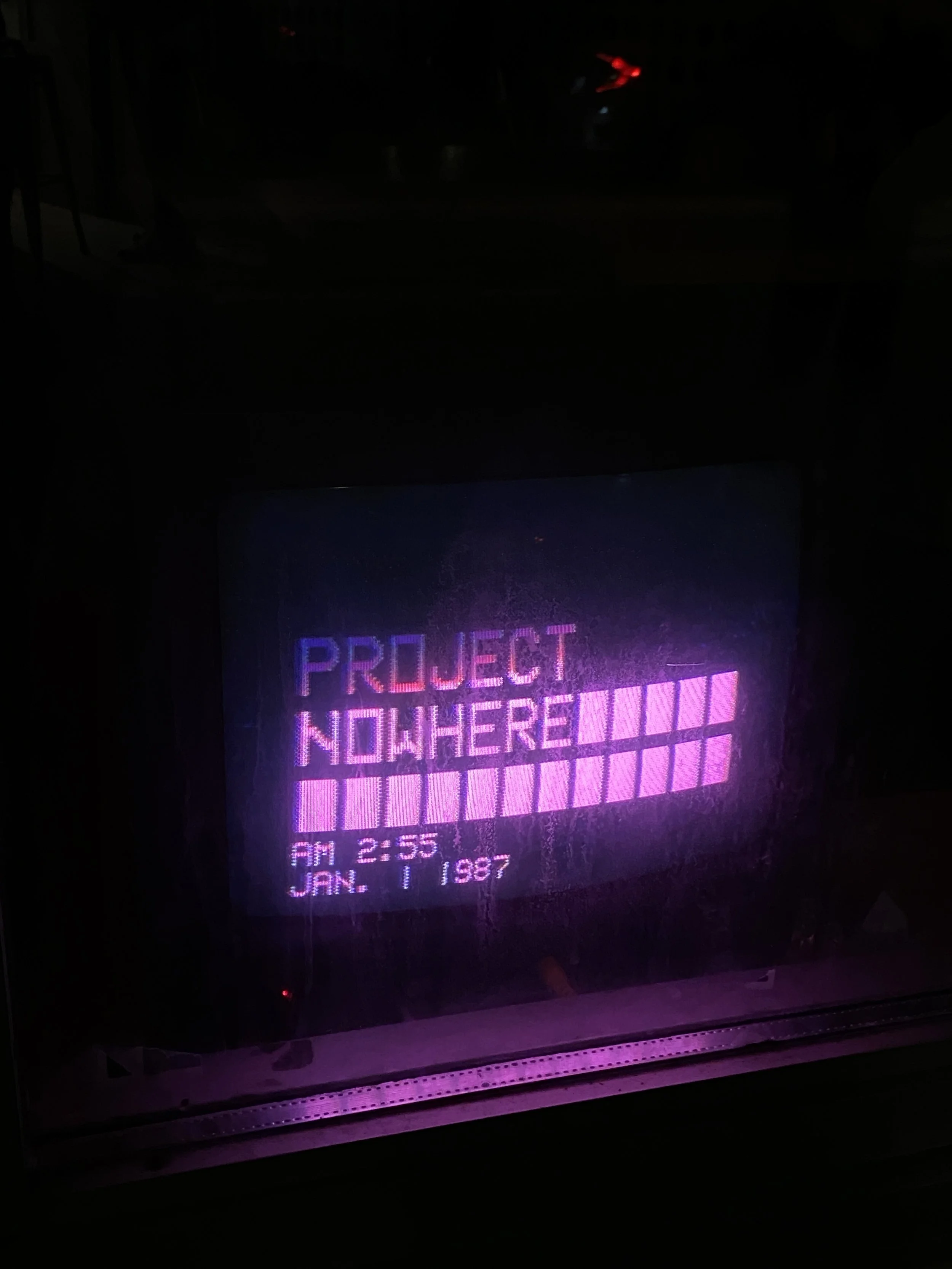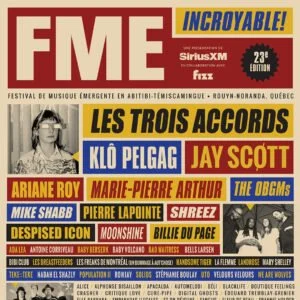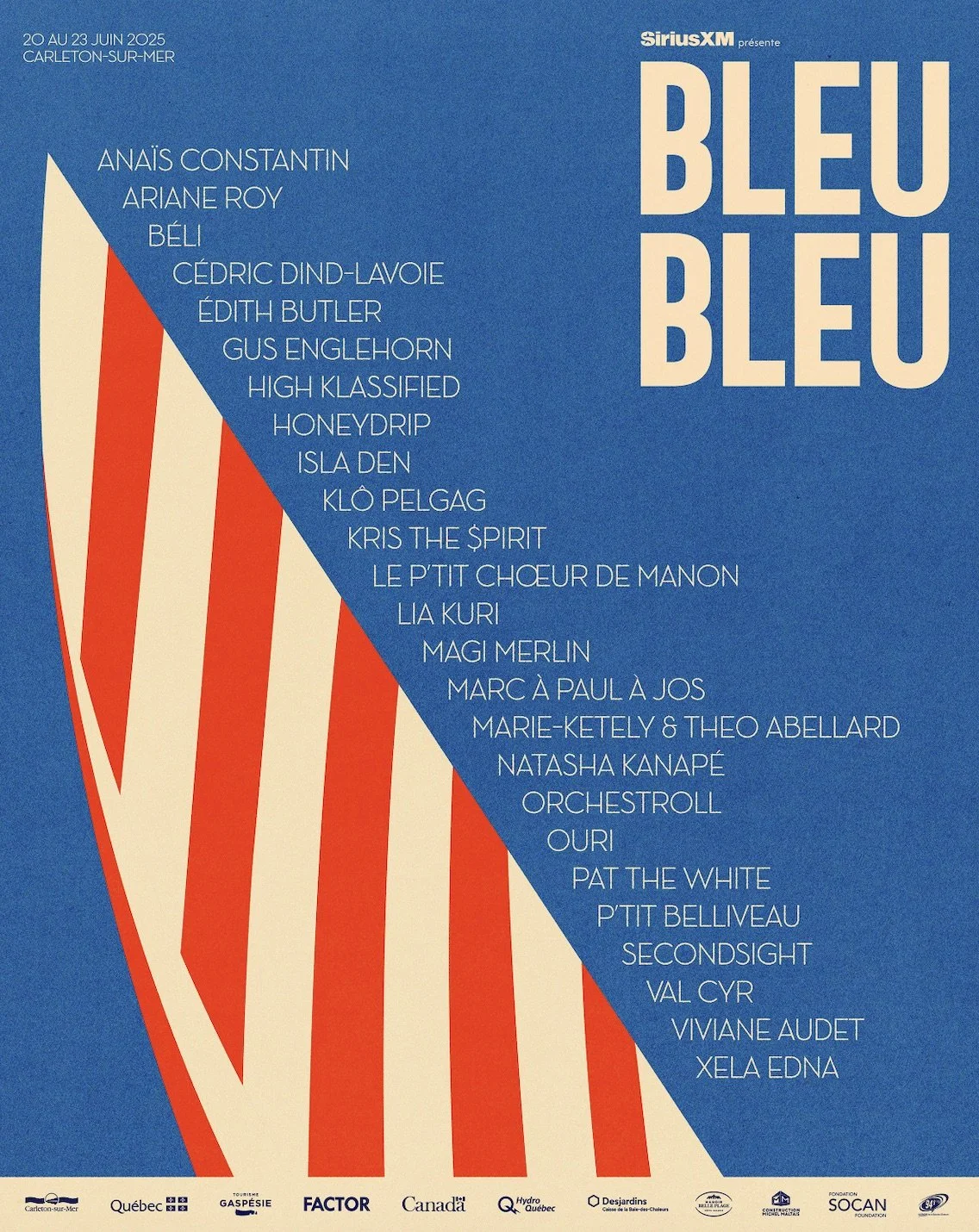Nature Is Healing, Change Is Imminent: YlangYlang Releases New Album "Cycles & Decay"
Image credit: Thomas Boucher
Imagine laying on a densely-covered forest floor, soft moss cushioning your head, enveloping your hands as you push into it, sinking deeper, becoming one with the foliage. A cool morning dew wets your clothes and you take a satisfying little stretch as you think, “I am but a small frog in an opportunity-filled pond.”
Or maybe you’re just cold, or too distracted by the loons crying on the lake. Either way, this small ritual of participating in the natural cycles of your surroundings strikes a chord - it’s comforting.
Catherine Debard’s new release, “Cycles & Decay,” on Montreal label Everyday Ago, is a reflection on the healing cycles found in nature - growth, decay, erosion, renewal. Debard is a prominent figure in Montréal’s electronic music scene, both in the underground as well as in the academic setting. Her experimental solo project, YlangYlang, spans over a decade of deep-rooted involvement through performances and releases featuring an elegant layering of field recordings over ambient drones, noise, spoken word poetry, and live instrumentals from collaborators.
Releasing on international labels including Crash Symbols (USA), Phinery (DK), Fluere Tapes (SE) and ΠΑΝΘΕΟΝ (RU), YlangYlang has also graced the line-ups at festivals including Suoni Per Il Popolo, Mutek Montréal, Electric Eclectics, Strangewaves, and Tone Deaf. Debard participated in a residency at Red Bull Music Academy at Calgary's National Music Center and in a workshop hosted by Suzanne Ciani.
Lose yourself in the deeply intimate organic soundscapes of “Cycles & Decay” - or in YlangYlang’s words in the, “decomposed sound matter,” “rotten music,” or “compost music” that sets its own parameters, flowing non-linearly towards healing - and check out the equally intimate interview below to be taken on a journey of slowing down, recalibrating, and taking inspiration from nature’s controlled chaos and unyielding cycles of creation and destruction.
Maya Hassa for Also Cool: What was the landscape you were in when making these recordings (either the field recordings or other parts as well) and what were you feeling while being there?
Catherine Debard: I began working on Cedar St. the day media were reporting about the Amazon forest wildfires, in August of 2019. I remember watching footage in awe, while recording cassette loops through distortion pedals. It felt pretty surreal, and heavy I guess. The song was actually called 'Cendres' (Ashes) until earlier this year. The four songs have an end-of-Summer-early-Fall vibe to them, so I'd say earthy landscapes, grey skies, crisp air, burnt orange, russet, crimson, amber, olive, and disintegrated fragments of nature scattered in lovely ways. I regularly roamed the back alleys from my house to Jarry Park back then - I usually walk when I need to ponder and clear my head.
I listened to the rough versions of the tracks, trying to find possible structures for them, unlocking the mysteries within. These walks were very contemplative. I felt deeply attuned to nature's slow decay, zooming my attention to dehydrated fruits, shrivelled delicate leaves, scattered strange shrubs, patches of moss, the smell of damp earth.
Also Cool: Maybe it’s because I’m in a forest while I write this, but Cedar St. and Waning Now sound like laying on the forest floor while being consumed by the moss and lichen surrounding you, maybe even decomposing with it. How would you describe the idea of decay in sound - in the composition of a piece, the sound manipulation, or the possibility of decaying music in its physical recorded state?
CD: While isolated at home last year, I became interested in trying to re-grow leaves from the cores of vegetables. On our kitchen table, I grew little leafy ecosystems, miniature islands in glass bowls. Leaves would grow to a certain point, then they'd wilt, and their entire appearance would start to shift. The greens would either fade or veer into yellows, browns, or peach tints, strange furs would appear as mold and slime began to spread. It was pretty captivating. Around the same time, I was contemplating the idea of 'shadow self', or in a very simplistic way, the subterraneous, dark counterpart of the conscious self that contains the ugly repressed stuff. I've oftentimes tried to bridge this disconnect between my mental activity (mostly rational and mundane), and the raw, unexplored potential underneath, which I can't access. I’ve wondered about the possibility of 'eroding the mind' metaphorically, using these decay processes I was witnessing in nature.
I've decided to apply this idea to music and composition. It led me to develop, within each song, a kind of relational system in which the sounds would interact with each other. I'd imagine various strategies in order for them to affect one another through various causal reactions, either in 'cooperative' or disruptive ways:
'What if, every time this sound erupts, it generates little patches of sound fur onto that layer of synth? What would happen to the synth?'
'What if the static quality of this recording was influenced by the dynamics of this bass movement as if it were pushed by the wind?'
'How can a piano emerge out of this rumble of sounds and evaporate into thin air?'
'Can the song flicker in a subtle way, like the sunlight seeping through the leaves of a tree?'
The more abstract, the better. It forced me to seek new mixing & assembling techniques that would concretize these conceptual ideas.
AC: The second track feels like sitting on a dock in the rain, glass bottles washing up on the shore, reminiscing. What is the meaning of the lyrics on Penumbra?
CD: That sounds really good, I wish I were there! Penumbra is a love song written just before the dawn of a relationship. Now that I think about it, it's the only love song I've ever written in a profuse catalogue of songs about relationships! It's telling - I've given a lot of thought on the subject, read countless books, and experienced various iterations of disappointment, frustration and doubt throughout the years. Then, in 2019, a new perspective emerged. Nothing new, really, but the difference was that instead of intellectualizing my way through it, I saw a concrete path.
The first step was to jump out of my head and dive inwards to investigate the darkened, the uncomfortable, the dim, the vague, the penumbral. What is in there?!! Then, I needed to foster a kinder relationship with my inner self, gather together all the pieces hidden in the corners, not just the flattering parts. Right around that time, I met someone I could imagine being this truer version of myself with, someone with whom I could explore and fabricate a new kind of relationship, something truly good. It felt dizzying, like being on the edge of a cliff and taking a leap into the unknown. That's what the song is about; the decision to make oneself vulnerable again, carefully, by removing the protective barriers - and also being intrigued by the unknown. It can even be a love song towards a renewed connection to oneself as well.
AC: There’s a sense of controlled chaos throughout the tracks - sounds cycle between harshness and what seems like the exaggerated or over-amplified sound of rushing water or wind, and lush, bright moments of renewal. The music has a natural, nonlinear behaviour, but also a sense of a journey towards healing, flowing between good and bad moments. Is this state of healing what the album title, “Cycles & Decay”, is also alluding to?
CD: Yes, totally! Change is imminent, it permeates everything, so I'm trying to make friends with it, to jam with it. I've had a good amount of highs and lows, I've struggled with my mental health, with my physical health, I've experienced losses, some harder to recover from than others, I am aware that I will suffer in the future too. With time, I started noticing the cyclic feel of my own life, the reoccurring waves, ever shifting, yet familiar. I thought that in order to avoid sourness, I should cooperate with the cycles instead of fighting against them. For me, that means being malleable, listening to myself more, trying to stay vulnerable and open (and not turn into ice), and exploring ways to heal and learn out of hardships, while developing tools that help me navigate the inevitable. Things will get rough again, but it's not a reason to reject happiness when it's available - or to cling to the good times. I want to be a positive force, not one that drags down.
As for chaos and non-linearity, I feel that it's what keeps me alert and challenges me in a good way. It would be easy to slip into stubbornness, despair or denial. We wake up every day and live in a society that isn't good for the majority of human beings - it's important to remember that again and again.
Whitesupremacy-colonialism-capitalism-racism-oppressivesystems-pillageanddestructionoftheEarth
Not only that, we also have to reckon with the toxic stuff we've inherited from them, some nasty things like the notion, for example, that if I don't have a respectable career, I am considered a failure. That's ugly, right? It makes absolutely no sense to me; my value system rejects this idea, and yet I struggle with it often!
There are so many things to deal with, all at the same time, and chaos wakes me up - it makes me pay attention! Noticing times like the other day, when I did something that went against my values, becoming aware of when I contradict myself, listening to other perspectives and genuinely trying to get them, being gracefully present during an afternoon by the railroad tracks, obsessing about the future and then, after a few days, feeling at peace with it. Being proud of a friend's achievement, while acknowledging a tinge of envy, saying ‘fuck off’ to the idea of perfection, being able to articulate a complicated idea out loud for the first time...
Working on music connects me with myself, eases the anxiety and helps me deal with unpredictability by creating my own unpredictable, chaotic musical landscapes and then, problem-solving / finding new ideas to make them sound good. I separate myself into two parts - a creative force and a destructive one. The destructive side is rambunctious, reckless, angry, sabotaging, it takes pleasure in making a mess, but it does so while trusting that the other side will come and harmonize everything. It's pretty therapeutic!
AC: Is there a story of a naturally occurring cycle or historical experience you would want to share? One that could provide some context to the cycles of sonic decay and rebirth you described?
CD: The first cycle I became aware of was the cycle of the Moon. As I became more cognizant of the external influences I bathed in, I grew better at handling my mood swings & energy fluctuations. I felt I could better cooperate with the intangible forces. Paying attention to my menstrual cycle gave me some precious insight, too! Instead of forcing things, I try to better respect my body and its rhythms. Seasons form an important cycle too. I realized recently that I often create sound material during the Summer, assemble it into songs during the Fall, and mix and master music during Winter. In the Spring I feel too scattered to do anything.
There are also larger life cycles, ones where you feel like you are tackling a big 'theme' in your life. I'll end by giving an example of one. A few years ago, I saw three snakes in the span of a month. The day before I caught sight of the first snake, I had a conversation with a friend about the concept of 'Mono No Aware' while sitting in the passenger seat of his car. As he pulled the definition and read it to me, I felt seen, as if something deep inside was acknowledged, followed by the realization I wasn't alone feeling this way. The first snake was a beautiful, golden and white snake in the middle of a dirt road in New Mexico, the second one was a lean black one with a red line on his back, and the third one, a smaller brownish grass-snake on a mountain in Hamilton, ON. I had always been afraid of snakes, as a symbol and in real life, and I had never seen any before. From then on, I associate a snake with the ouroboros symbol, and seeing one signals a new start for me.
AC: I can’t help but ask what your workshop with Suzanne Ciani was about?
CD: Suzanne Ciani is so inspiring. As legendary as she is, she emanates realness - and that's truly refreshing. She mostly talked to us about her relationship with the Buchla synthesizer, showed us her way around it, how to set it up, how to build a sequence. I'd never even dreamed of playing with one myself, so it was great to get to learn about the electrical pathways and how it modulates within the machine. It gave me ideas about composition - that's what financial constraint does, it motivates you to find alternative ways to create results, I'm getting quite good at it! Suzanne also shared stories from her early days in the experimental electronic music scene, and how she built a pretty inspiring career for herself by staying bold and determined. I hope I soaked up some of her energy!
Listen to “Cylces & Decay” below
YlangYlang
Bandcamp I Instagram I Soundcloud I Spotify
Composed & Produced by Catherine Debard
Recorded between 'my apartment in Montréal'
& Fort Rose, Hamilton in 2019
Catherine Debard: Piano, Synthesizers, Field Recordings, Noises & Textures, Vocals
Connor Bennett: Saxophone & Effects on Track 2 & 4
Evelyn Charlotte Joe: Acoustic Guitar & Effects on Track 2
Upright Bass & Toy Piano on Track 4
Video for Cedar St. by Charline Daily
Mastered by Amar Lal
Artwork by Catherine Debard




















